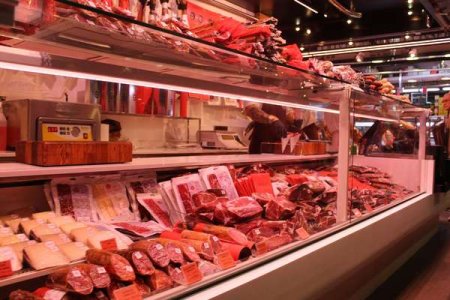Prices of essential items like meat & coffee might shoot up by 2025 – What’s the best way to prepare for it?
- Replies 0
In 2025, Americans may find themselves forking over more cash than ever for their daily essentials. From the sizzle of a steak to the morning aroma of freshly brewed coffee, the price tags on these staples could see a significant hike.
But why is this happening, and what can you do to safeguard your budget? Let's delve into the factors at play and explore some savvy strategies to keep your expenses in check!
As the calendar flips to 2025, the economic landscape could be dramatically reshaped by the policies of President-elect Donald Trump.
With a plan to impose hefty tariffs on imports from key trading partners like Canada, Mexico, and China, the ripple effect on consumer prices could be substantial.
Trump's proposed tariffs—a 25% levy on goods from Canada and Mexico, and a 10% tariff on Chinese imports—are intended as a hardline measure to address illegal immigration and drug trafficking.
However, these tariffs could also ignite a surge in the cost of living for everyday Americans.

Experts and organizations are sounding the alarm, warning that these tariffs could exacerbate inflation and strain household budgets. The think tank Third Way anticipates that a typical family's annual grocery bill could climb by $185, marking a 3.3% increase.
This uptick in prices is expected to hit lower-income families the hardest, as they spend a larger portion of their income on essentials.
Gabe Horwitz, senior vice president for Third Way’s economic program stated, “Prices are absolutely going to rise, because the added costs from increased tariffs will be paid by the consumer.”
Michael Snipes, an economics professor at the University of South Florida, echoes this sentiment, cautioning that tariffs will “increase prices for everything that's imported, and that includes food.”
The United States relies heavily on imports for a variety of grocery items.
From China, we receive fish, vegetables, fruit, cereal, coffee, tea, sugar, cocoa, dairy products, eggs, and vinegar.
Canada supplies us with wood, charcoal, aluminum, alcoholic beverages, books, and cotton. With tariffs in place, the cost of these goods could soar, leaving consumers to bear the brunt.
"Tariffs would hit Americans everywhere, from grocery bills, to back-to-school shopping, to home furnishing, and electronics. And these economic effects may only be amplified by the likely retaliation of other countries on America's exporting businesses," Third Way reported in its analysis.

While the full effects of the tariffs will unfold in 2025, there are steps you can take now to mitigate the financial hit:
1. Stock Up Smartly: Consider purchasing non-perishable items in bulk before prices go up. Items like coffee, tea, and canned goods can be stored for extended periods.
2. Go Local: Support local farmers and producers. Not only does this reduce reliance on imported goods, but it also keeps money within your community.
3. Grow Your Own: If you have the space, start a garden. Growing your own vegetables and herbs can significantly cut down on grocery bills.
4. Explore Alternatives: Look for less expensive substitutes for your favorite items. For example, if meat prices skyrocket, plant-based proteins might offer a more affordable and healthy alternative.
5. Budget Wisely: Review and adjust your household budget to accommodate potential price increases. Allocating funds now can help ease the transition.
If you want to learn more about how the new tariffs will affect your budgeting and upcoming purchases, you can read this story here.

Are you concerned about rising prices for essentials like meat and coffee? Have you started to adjust your shopping habits in anticipation? Share your strategies and thoughts in the comments below!
But why is this happening, and what can you do to safeguard your budget? Let's delve into the factors at play and explore some savvy strategies to keep your expenses in check!
As the calendar flips to 2025, the economic landscape could be dramatically reshaped by the policies of President-elect Donald Trump.
With a plan to impose hefty tariffs on imports from key trading partners like Canada, Mexico, and China, the ripple effect on consumer prices could be substantial.
Trump's proposed tariffs—a 25% levy on goods from Canada and Mexico, and a 10% tariff on Chinese imports—are intended as a hardline measure to address illegal immigration and drug trafficking.
However, these tariffs could also ignite a surge in the cost of living for everyday Americans.

These tariffs are expected to potentially lead to higher prices for essentials such as meat, coffee, and other grocery items. Image source: Pexels / Federico Arnaboldi.
Experts and organizations are sounding the alarm, warning that these tariffs could exacerbate inflation and strain household budgets. The think tank Third Way anticipates that a typical family's annual grocery bill could climb by $185, marking a 3.3% increase.
This uptick in prices is expected to hit lower-income families the hardest, as they spend a larger portion of their income on essentials.
Gabe Horwitz, senior vice president for Third Way’s economic program stated, “Prices are absolutely going to rise, because the added costs from increased tariffs will be paid by the consumer.”
Michael Snipes, an economics professor at the University of South Florida, echoes this sentiment, cautioning that tariffs will “increase prices for everything that's imported, and that includes food.”
The United States relies heavily on imports for a variety of grocery items.
From China, we receive fish, vegetables, fruit, cereal, coffee, tea, sugar, cocoa, dairy products, eggs, and vinegar.
Canada supplies us with wood, charcoal, aluminum, alcoholic beverages, books, and cotton. With tariffs in place, the cost of these goods could soar, leaving consumers to bear the brunt.
"Tariffs would hit Americans everywhere, from grocery bills, to back-to-school shopping, to home furnishing, and electronics. And these economic effects may only be amplified by the likely retaliation of other countries on America's exporting businesses," Third Way reported in its analysis.

Expert analyses and think tanks like Third Way anticipate that the tariffs could cause an increase in the yearly grocery bills for the typical family. Image source: Pexels / Tim Samuel.
While the full effects of the tariffs will unfold in 2025, there are steps you can take now to mitigate the financial hit:
1. Stock Up Smartly: Consider purchasing non-perishable items in bulk before prices go up. Items like coffee, tea, and canned goods can be stored for extended periods.
2. Go Local: Support local farmers and producers. Not only does this reduce reliance on imported goods, but it also keeps money within your community.
3. Grow Your Own: If you have the space, start a garden. Growing your own vegetables and herbs can significantly cut down on grocery bills.
4. Explore Alternatives: Look for less expensive substitutes for your favorite items. For example, if meat prices skyrocket, plant-based proteins might offer a more affordable and healthy alternative.
5. Budget Wisely: Review and adjust your household budget to accommodate potential price increases. Allocating funds now can help ease the transition.
If you want to learn more about how the new tariffs will affect your budgeting and upcoming purchases, you can read this story here.
Key Takeaways
- President-elect Donald Trump has proposed significant tariffs on imports from Canada, Mexico, and China beginning in 2025.
- These tariffs are expected to potentially lead to higher prices for essentials such as meat, coffee, and other grocery items.
- Expert analyses and think tanks like Third Way anticipate that the tariffs could cause an increase in the yearly grocery bills for the typical family.
- The potential price increases stemming from the tariffs may disproportionately impact those with lower incomes, and the broader economic effects could extend to various consumer goods beyond groceries.
Are you concerned about rising prices for essentials like meat and coffee? Have you started to adjust your shopping habits in anticipation? Share your strategies and thoughts in the comments below!






